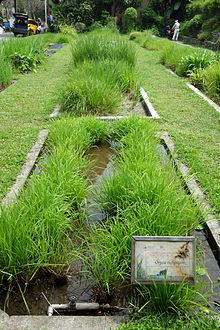Oryza rufipogon
| Oryza rufipogon | |
|---|---|

| |
| Scientific classification | |
| Kingdom: | |
| (unranked): | |
| (unranked): | |
| (unranked): | |
| Order: | |
| Family: | |
| Genus: | |
| Species: | O. rufipogon
|
| Binomial name | |
| Oryza rufipogon | |
Oryza rufipogon, known as brownbeard rice,[1] wild rice[2] and red rice,[2] is a member of the genus Oryza. It has a close evolutionary relation to Oryza sativa, the rice grown as a major food crop throughout the world. O. rufipogon is listed as a "noxious weed" by the United States,[3] and is listed as a noxious weed in Alabama, California, Florida, Massachusetts, Minnesota, North Carolina, Oregon, South Carolina, and Vermont. According to the North American Plant Protection Association, O. rufipogon blends in with cultivated O. sativa so well that it cannot be detected. In this position it competes with the cultivated rice and uses valuable fertilizer and space. O. rufipogon sheds most of its seeds before the harvest, therefore contributing little to the overall yield. In addition, the rice grains produced by the plant are not eaten by consumers, who see it as a strange foreign particle in otherwise white rice.[4]
Precious germplasm
A paper on conservation genetics of wild rice in the journal Molecular Ecology has this to say about O. rufipogon: "This is the most agriculturally important but seriously endangered wild rice species."
In India, the Pallikaranai marshland contains the wild rice Oryza rufipogon, described by Salim Ali Centre for Ornithology and Natural History (SACON) as a "precious germplasm."[5]
References
- ^ NRCS. "Oryza rufipogon". PLANTS Database. United States Department of Agriculture (USDA). Retrieved 25 July 2015.
- ^ a b "USDA GRIN Taxonomy".
- ^ Plant Protection and Quarantine. 2006. Federal noxious weed list (24 May 2006). USDA Animal and Plant Health Inspection Service. Washington, DC. 2pp. http://plants.usda.gov/java/profile?symbol=ORRU
- ^ NAPPO - PRA / Grains Panel Pest Fact Sheet - Oryza rufipogon Griff. June / 2003, http://www.nappo.org/PRA-sheets/Oryzarufipogon.pdf
- ^ The Hindu/Vanishing Wetlands- 09 March 2005, http://www.hindu.com/2005/03/09/stories/2005030903421000.htm
